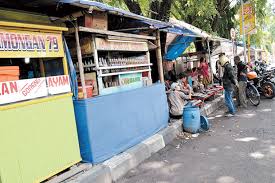Country Forbidding the Giving Country
Perhaps we have not realized why the existence of street vendors or stall increasingly rampant existence, almost every sidewalk we can find, this is not apart from the government's role that is less quickly to cope or anticipate the growth. If only the government quickly prevented it there might be no illegal traders who use the sidewalks as a place to sell.
Changes to the function of the sidewalk into a place of personal business is increasingly becoming-so good only in the form of tarpaulins, tents and even semi-permanent buildings have been there. This happens because of many factors, in addition to the weak role of government in enforcing law enforcement regulations there are other parties that cause the growth of wild traders is growing rapidly that is in this case is the PLN which is a state-owned official company. PLN, which is supposed to be a state-owned company, must support all existing regulations, rather than assist in the misuse of sidewalk functions.
Street vendors or Stalls prohibited by the state for being in unofficial places in almost all of Indonesia can be found both on the sidewalks of suburbs and even in the city, from small towns to big cities we can find in almost all of Indonesia . There is no prohibition for any merchant who does such a thing, this prohibition is clearly contained in the state sheet from the level of the Act to the Regency / City Regulation. The prohibition to build a building on the sidewalk is not unreasonable, in addition to violating existing rules, has also damaged the beauty of the city and besides that it also reduces the Pendapatan Asli Daerah (PAD) because of its existence has no IMB and SIU SITU.
But in reality the rules that have been made are not supported by the providers of electricity in Indonesia. Supposedly PLN is a state-owned company aware of the regulations that regulate the ban on building a pavement on the sidewalk or on the shoulders of the road that is broken for pedestrians. If PLN does not provide electricity to the merchants, it could be that the number of traders using the sidewalks as a place to sell will be reduced, even none at all, even if somebody uses a generator set for lighting, but PLN has assisted the government in terms of prohibiting the existence of Stalls on the sidewalk because it no longer provides electricity services.
Countries represented by Provincial Governments and even District / City Governments prohibit the existence of street vendors along Street or Sidewalk by making prohibition rules selling along roads and sidewalks, but the rules do not underlie PLN to not provide Electricity Facilities for street vendors (PKL) or a kiosk to get it. So the stalls are mushrooming along the sidewalks of the highways.
The phenomenon that occurred in Indonesia we can see from the stalls that are on the roadside even on the sidewalk that has official facilities from the State. This facility is provided for rule violators in almost all of Indonesia. What facility is it ?, The facility is in the form of electricity provided by the state-owned company PLN.
If PLN does not allow the provision of electricity facilities for street vendors or stalls on the sidewalks, PLN can take action against the PLN who has done the installation of the Electricity, because if it continues to be left, then do not be surprised if in a few years we will see the increase again new slums in towns even in the village.
There are 2 (two) kinds of punishment that can be imposed on people who use sidewalks as private property and disrupt pedestrians:
The criminal penalty for any person causing disruption to the function of the road equipment is punishable with a maximum imprisonment of 1 (one) year or a fine of not more than Rp24,000,000.00 (twenty four million rupiah) (Article 274 clause (2) of the UU LLAJ); or
Any person committing acts that result in interference with the Traffic Signage, Road Marking, Traffic Alert Provider, Pedestrian Facilities, and Road User Safety Equipment, are subject to maximum 1 (one) month imprisonment or maximum fine Rp250.000,00 (two hundred fifty thousand rupiah) (Article 275 clause (1) of the UU LLAJ )